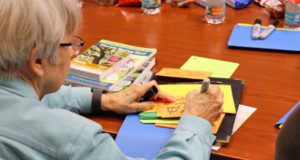This new 4-page publication provides an introduction for researchers and evaluators wishing to use qualitative methods of interviews and focus groups. The document covers a short background on qualitative methods versus quantitative methods and offers practical tips on piloting your questions, preparing your materials, and conducting the interview or focus group. Written by Kathryn A. Stofer and published by the UF/IFAS Department of Agricultural Education and Communication, this EDIS article is designed to accompany AEC675, Preparing for One-on-One Qualitative Interviews: Designing and Conducting the Interview.
https://edis.ifas.ufl.edu/wc339
Tag: Qualitative Research
Preparing for One-on-One Qualitative Interviews: Designing and Conducting the Interview
This new 4-page document provides instructions on designing the question guide and conducting one-on-one interviews for qualitative data collection. It covers common types of interviews and their uses as well as strategies to use when asking the questions of the interviewee. This document is designed to accompany AEC676, Preparing for One-on-One Qualitative Interviews: Logistics. Written by Kathryn A. Stofer and published by the UF/IFAS Department of Agricultural Education and Communication.
https://edis.ifas.ufl.edu/wc338
Using Journey Mapping within Extension: A Tool for Supporting Behavior-Change Programs
 Extension is an important change agency, and Extension professionals use innovative strategies to help target audiences to adopt research-based practices and technologies. Tools from commercial marketing can be applied to behavior-change campaigns, often through an underused approach known as social marketing. Journey maps can be developed with Extension clients to provide insight into their progression and decision-making from one place or state of being to another. A journey can be the steps a person takes when selecting plants for the landscape, the decision-making process used when identifying agricultural business strategies, or the steps a person takes when leaving a workshop and travelling to their home. This new 9-page publication of the UF/IFAS Department of Agricultural Education and Communication, written by Colby Silvert and Laura A. Sanagorski Warner, presents possible applications of journey mapping within an Extension context.
Extension is an important change agency, and Extension professionals use innovative strategies to help target audiences to adopt research-based practices and technologies. Tools from commercial marketing can be applied to behavior-change campaigns, often through an underused approach known as social marketing. Journey maps can be developed with Extension clients to provide insight into their progression and decision-making from one place or state of being to another. A journey can be the steps a person takes when selecting plants for the landscape, the decision-making process used when identifying agricultural business strategies, or the steps a person takes when leaving a workshop and travelling to their home. This new 9-page publication of the UF/IFAS Department of Agricultural Education and Communication, written by Colby Silvert and Laura A. Sanagorski Warner, presents possible applications of journey mapping within an Extension context.
http://edis.ifas.ufl.edu/wc333
Using Qualitative Research in Planning and Evaluating Extension Programs (FCS6010/FY392)
 Qualitative research is a useful tool for understanding extension programs and can complement quantitative methods, because qualitative information, such as interviews, focus groups, ethnography, observation, and case studies, can help faculty gain a rich understanding of the issues they are addressing. This 3-page fact sheet provides a brief overview of qualitative research and discusses the ways in which it can be used in planning and evaluating extension programs. Written by Lisa A. Guion, Lamont Flowers, David C. Diehl, and Debra McDonald, and published by the UF Department of Family Youth and Community Sciences, August 2011. (Image by Parul Vora. CC-BY-2.5. Wikimedia Commons)
Qualitative research is a useful tool for understanding extension programs and can complement quantitative methods, because qualitative information, such as interviews, focus groups, ethnography, observation, and case studies, can help faculty gain a rich understanding of the issues they are addressing. This 3-page fact sheet provides a brief overview of qualitative research and discusses the ways in which it can be used in planning and evaluating extension programs. Written by Lisa A. Guion, Lamont Flowers, David C. Diehl, and Debra McDonald, and published by the UF Department of Family Youth and Community Sciences, August 2011. (Image by Parul Vora. CC-BY-2.5. Wikimedia Commons)
http://edis.ifas.ufl.edu/fy392
Triangulation: Establishing the Validity of Qualitative Studies (FCS6014/FY394)

Triangulation is a method used by qualitative researchers to check and establish validity in their studies by analyzing a research question from multiple perspectives. This 3-page fact sheet presents five types of triangulation. Written by Lisa A. Guion, David C. Diehl, and Debra McDonald , and published by the UF Department of Family Youth and Community Sciences, August 2011. (UF/IFAS file photo)
http://edis.ifas.ufl.edu/fy394
Conducting an In-depth Interview (FCS6012/FY393)
 In-depth interviewing is a tool for collecting rich information that can inform program development and evaluation. Learn the basics with this 3-page fact sheet written by Lisa A. Guion, David C. Diehl, and Debra McDonald, and published by the UF Department of Family Youth and Community Sciences, August 2011. (UFIFAS photo by Marisol Amador)
In-depth interviewing is a tool for collecting rich information that can inform program development and evaluation. Learn the basics with this 3-page fact sheet written by Lisa A. Guion, David C. Diehl, and Debra McDonald, and published by the UF Department of Family Youth and Community Sciences, August 2011. (UFIFAS photo by Marisol Amador)
http://edis.ifas.ufl.edu/fy393
